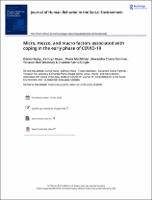Please use this identifier to cite or link to this item:
https://hdl.handle.net/20.500.12202/6511Full metadata record
| DC Field | Value | Language |
|---|---|---|
| dc.contributor.author | Krase, Kathryn | - |
| dc.contributor.author | Wang, Donna | - |
| dc.contributor.author | MacMillan, Thalia | - |
| dc.contributor.author | Fishman, Alexandra Chana | - |
| dc.contributor.author | Witonsky, Yonason Ron | - |
| dc.contributor.author | Parris-Stingle, Chantee | - |
| dc.date.accessioned | 2020-12-11T15:13:38Z | - |
| dc.date.available | 2020-12-11T15:13:38Z | - |
| dc.date.issued | 2020-12-10 | - |
| dc.identifier.citation | Krase, Kathryn, Donna Wang, Thalia MacMillan, Alexandra Chana Fishman, Yonason Ron Witonsky & Chantee Parris-Stingle. Micro, mezzo, and macro factors associated with coping in the early phase of COVID-19. Journal of Human Behavior in the Social Environment, https://doi.org/10.1080/10911359.2020.1838985 | en_US |
| dc.identifier.issn | 1091-1359 | - |
| dc.identifier.uri | https://doi.org/10.1080/10911359.2020.1838985 | en_US |
| dc.identifier.uri | https://hdl.handle.net/20.500.12202/6511 | - |
| dc.description | Research article / open access | en_US |
| dc.description.abstract | Coping and adapting to crisis can be influenced by numerous factors on multiple levels. The experience during the beginning of the COVID-19 pandemic is no different. This article reports on the results of a cross-sectional, online survey administered to adults living in the United States and Canada in June 2020 (N = 1,405). Hierarchical multiple regression analysis found that respondent’s age, support of family and friends, support of children’s school, use of alcohol and substances, level of trust/satisfaction with national government, being overwhelmed by the amount of COVID-related information, and level of life disruption accounted for 12% of the variance for level of self-reported coping. This study did not find that race or gender impacted self-reported coping. Discussion and implications at the micro, mezzoand macro levels are offered. | en_US |
| dc.language.iso | en_US | en_US |
| dc.publisher | London, UK: Routledge ; Taylor & Francis | en_US |
| dc.relation.ispartofseries | Full Terms & Conditions of access and use can be found athttps://www.tandfonline.com/action/journalInformation?journalCode=whum20Journal of Human Behavior in the Social Environment;2020 | - |
| dc.rights | Attribution-NonCommercial-NoDerivs 3.0 United States | * |
| dc.rights.uri | http://creativecommons.org/licenses/by-nc-nd/3.0/us/ | * |
| dc.subject | COVID-19 | en_US |
| dc.subject | social distancing | en_US |
| dc.subject | social support | en_US |
| dc.subject | coping | en_US |
| dc.title | Micro, mezzo, and macro factors associated with coping in the early phase of COVID-19. | en_US |
| dc.type | Article | en_US |
| dc.contributor.orcid | 0000-0002-6140-4223 | |
| local.yu.facultypage | https://www.yu.edu/faculty/pages/krase-kathryn | |
| Appears in Collections: | Wurzweiler School of Social Work: Faculty publications | |
Files in This Item:
| File | Description | Size | Format | |
|---|---|---|---|---|
| Krase, et al. 10Dec2020 Micro mezzo and macro factors associated with coping in the early phase of COVID 19.pdf | 664.37 kB | Adobe PDF |  View/Open |
This item is licensed under a Creative Commons License

